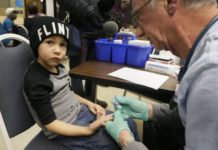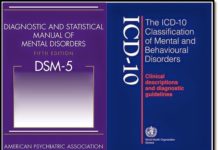Meta-Analysis Finds Asking About Suicidal Thoughts Does Not Predict Suicide
A recent meta-analysis finds that the association between reported suicidal ideation and later suicide is low.
Non-Pharmacological Interventions More Effective For Health in Schizophrenia
Review compares the effectiveness of pharmacological and non-pharmacological interventions for improving physical health outcomes in people diagnosed with schizophrenia.
Racial Discrimination a Clear Contributor to Youth Mental Health Disparities
Greater perceptions of discrimination during adolescence are linked to more depressive and internalizing symptoms.
More Evidence for the Lasting Psychological Impact of Lead Exposure in Childhood
New research points to numerous harmful effects of high-level lead exposure in childhood on adult mental health and personality characteristics.
Opioids May Cause Depression and Worsen Chronic Pain
“Converging lines of evidence now suggest that depression—a common comorbidity in the setting of chronic pain—may in some patients represent an unrecognized yet potentially reversible harm of opioid therapy.”
Peer Providers of Mental Health Services Use Personal Narratives to Help
Interviews with peer providers indicate that they strategically use their personal illness and recovery story in order to assist others.
Researchers Challenge Interpretation of Antidepressant Meta-analysis
Researchers question the overstated results of a large antidepressant meta-analysis and point to cultural pressures to turn to these drugs for a quick fix.
5 Steps to Personalize Deprescribing Practices
Researchers identify simple ways for clinicians to begin deprescribing conversations.
Technology Not a Strong Factor in Adolescent Well-being, New Study Claims
A new study suggests digital media use among adolescents has a smaller negative effect on well-being than bullying or smoking marijuana.
Treatment Guidelines Should Not Be Written by Professional Societies and Insiders
John Ioannidis, a leading expert on research methods, takes a critical look at the way professional societies write treatment guidelines.
Critical Psychologist On How Scientific Research Can Influence Public Policy
Critical participatory action research conducted on the higher education programs offered in prison leads to mobilized advocacy and shifts in public policy.
Developing Alternatives to the DSM for Psychotherapists
A new article suggests counselors and psychotherapists are dissatisfied with current diagnostic systems and outlines some potential alternatives.
Climate Change Negatively Impacts Mental Health, Study Finds
Climate change-related extreme weather and increasing temperatures associated with higher rates of mental health challenges.
Polypharmacy Associated with Cognitive Decline in Elderly Patients
Study finds that elderly patients taking at least 5 medications were at increased risk of mild cognitive impairment and dementia.
United Nations Rep Brings Attention to Human Rights Violations in Psychiatry
Dr. Dainius Pūras argues that the status quo in mental health treatment is no longer acceptable and demands political action to promote human rights.
Better Outcomes Off Medication for Those Recovered from First-Episode Schizophrenia
A new study has found that of 10 people who were fully recovered from their first episode of schizophrenia (FES), those not taking antipsychotics did better in terms of cognitive, social, and role functioning—and reached full recovery more quickly.
Psychologists Advise How to Help and Minimize Harm Working With Migrants and Refugees
While well intentioned, providers and volunteers can do more harm than good at the border. The Global Psychosocial Network issues guidelines on how to work for the benefit of migrants and refugees.
Study Identifies Psychiatric Patients at Greatest Risk of Coercion
In an effort to reduce coercion, researchers isolate associated factors including age, relationship status, location, and diagnosis.
Flexible Treatment Planning Improves Depression Outcomes in Youth
Researchers explore the effects of augmented treatment at various points in interpersonal psychotherapy for adolescents diagnosed with depression, highlighting previously unidentified critical decision points (i.e., relatively early in the treatment sequence).
Prenatal Valproate Exposure Linked with ADHD Diagnosis in Children
Children who were exposed to anti-seizure drug valproate in utero were 48% more likely to develop ADHD, according to a new study.
Study Links Antidepressants and Decreased Coping Behaviors Across Generations
Biologists found that exposure to antidepressants suppresses important survival behaviors in zebrafish, an effect that persisted across three generations and was found to be more severe for males.
Can Cultural Engagement Protect Against Depression?
A new study examines the preventative effects of cultural engagement has on depression among older adults.
Individuals with Psychosis Symptoms More Likely to be Victimized
Individuals diagnosed with a psychotic disorder are 4-6 times more likely than the general population to experience victimization.
More Research Needed on Climate Change-Related Ecological Grief
Researchers outline the concept of ecologically driven grief due to climate change and recommend future research to better understand the psychological impact of climate change.
What is Contributory Injustice in Psychiatry?
An article on contributory injustice describes the clinical and ethical imperative that clinicians listen to service users experiences.

































